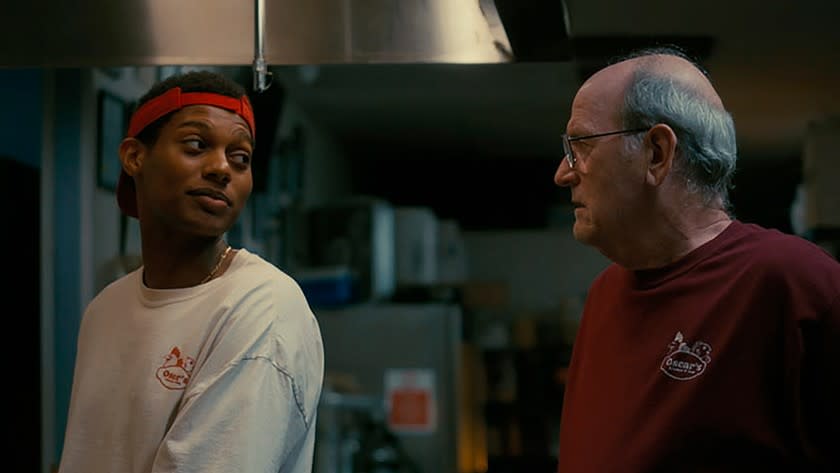Review: 'The Last Shift' takes aim at white privilege in the working class, but it fails to ignite

The Times is committed to reviewing theatrical film releases during the COVID-19 pandemic. Because moviegoing carries risks during this time, we remind readers to follow health and safety guidelines as outlined by the Centers for Disease Control and Prevention and local health officials.
Many artists and journalists have tried to crack the code of the white working class in recent years. “The Last Shift,” a wan comedy-drama written and directed by Andrew Cohn that debuted at Sundance in January, is the latest offering to swing and miss.
The setup is promising. Richard Jenkins plays Stanley, a 38-year employee of Oscar’s Chicken and Fish in Albion, Mich. (it’s sarcastically noted as “a regional chain”), who plans to quit and move to Sarasota, Fla., to liberate his ailing mother from a nursing home. All he has to do is train his replacement on the graveyard shift.
Shane Paul McGhie plays Jevon, a young Black man hired to fill that role by Stanley’s boss, Shazz (Da'Vine Joy Randolph). Jevon is not overjoyed to be there, but employment is part of his parole agreement after he was convicted of defacing a public monument among other minor transgressions.
The first half of the film is a standard workplace comedy full of jokes that demand rimshots and lines of dialogue you will find yourself mouthing just before the characters say them. We learn that Stanley is a none-too-smart guy who is not up to the life change he is about to embark on, and the observant Jevon views him as not much more than a cautionary tale.
They eventually bond, of course, and the film appears to be heading toward a saccharine let’s-all-sing-“Kumbaya” ending. But then it takes a welcome turn. Jevon’s witty stream of social justice zingers finally strikes a nerve, and we see Stanley for who he is, a white man whose views have not changed in 50 years.
This sets in motion a tragic series of events that Cohn laudably, if moralistically, allows to play through without adding a nice, tidy bow. And that’s great, except for one thing: Stanley.
Casting Jenkins, a fearless actor, was genius. The entire movie is infinitely more watchable because of his presence, but as written, Stanley is a cipher, a blank slate. Beyond Jenkins’ performance, there’s no there there. His situation — nearly four decades in the same dead-end job, living in what looks like a halfway house, with no obvious outside interests beyond some old baseball mementos kept in a strong box — is not particularly credible. It’s not a plus when a movie's protagonist is only the fourth or fifth most interesting character.
Jevon, on the other hand, has a lot going on. He has an infant son, a girlfriend who’s lost patience with him and a mind bursting with ideas and opinions (any millennial who references Willis Reed has my attention). McGhie is sharp and charismatic as a kid who acts like he’s got it all figured out but is clearly lost. It's disappointing we don't get to know more about that guy.
Indeed, it would be nice to know more about Shazz, who is sympathetic to Jevon’s situation but also pragmatic enough to know that clocks need to be punched and bills have to be paid; or Sydney (Birgundi Baker), who sacrificed running track and attending college to have Jevon’s baby; or even Fernando (Dano Duran), Oscar’s dishwasher, who barely has a line of dialogue but gave up being a geography teacher in Latin America to come to the U.S.
Stanley simply isn’t a strong enough foil for Jevon if you want to dramatize attitudes about race in America. Now Dale, played by Ed O’Neill, Stanley’s only apparent friend, is another story. In his first scene, Dale utters one line (“Jevon? What the hell kind of name is that?”) that hints at the conflict that might have brewed between those two, had they shared more screen time.
Cohn, an Emmy-winning documentary filmmaker, likely was aiming for subtlety, but these are not subtle times. Trying to get a spark from a damp match is a lot harder than holding a flame to dry kindling.


